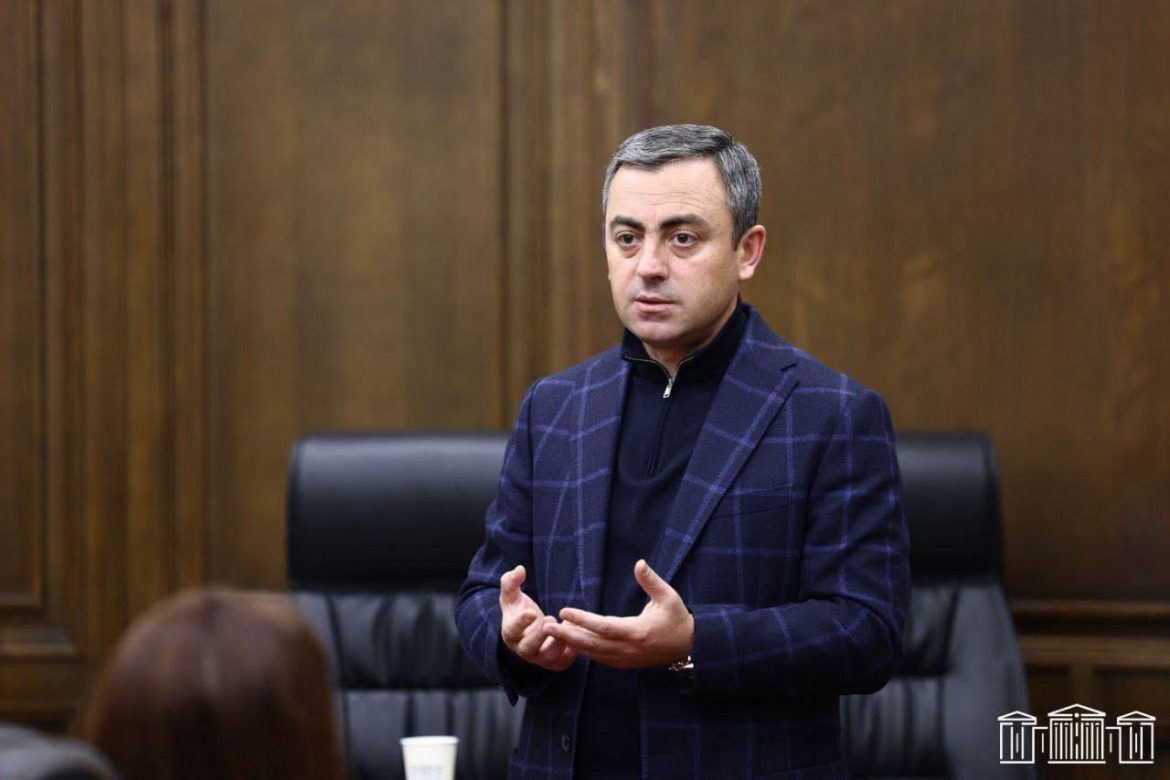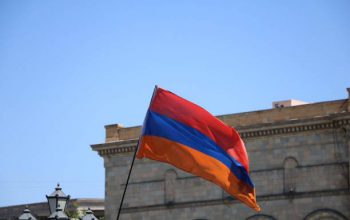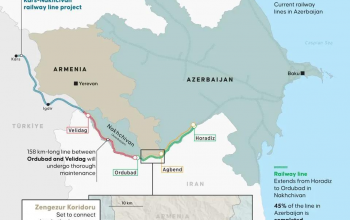Armenian opposition leaders have accused Prime Minister Nikol Pashinyan of preparing to open an extraterritorial corridor to Azerbaijan’s Nakhichevan exclave through Armenia’s Syunik province, calling it another major concession to Baku.
Pashinyan confirmed on Wednesday that his government is considering a proposal from the United States to delegate control over cargo and passenger movement along that route to a foreign company. He said the arrangement, which has been “intensively” discussed with Azerbaijan, would allow Azerbaijani travelers to use the corridor without coming into contact with Armenian border or customs officers.
Baku has long insisted that any route connecting Azerbaijan to Nakhichevan must bypass Armenian border checks. Yerevan has rejected that demand until now, insisting that Armenia must retain full control and jurisdiction over any such connection.
“Pashinyan effectively confirmed that he agrees to provide a corridor through Syunik to Azerbaijan,” said Ishkhan Saghatelyan, a senior member of the opposition Armenian Revolutionary Federation (ARF). “A corridor where Armenia’s sovereignty and jurisdiction will be limited.”
In a social media post late Wednesday, Saghatelyan claimed the plan for third-party oversight was a smokescreen and that “Azerbaijan and Turkey are the sole and main beneficiaries of the project.” He added that the ARF, a key member of the Hayastan opposition alliance, will work to prevent its implementation “together with our people.”
“We will do everything in our power to thwart the plan to turn Armenia into a Turkish vilayet,” said Saghatelyan, who heads the ARF Supreme Body in Armenia.
Pashinyan has argued that allowing a third party to manage the corridor would not affect Armenia’s sovereignty. He compared the proposal to existing agreements under which foreign companies operate Zvartnots International Airport, Armenia’s water supply system, and railway network.
Opposition lawmakers dismissed that comparison. They noted that travelers arriving at Zvartnots, which is operated by an Argentinian firm, still pass through Armenian customs and passport control.
Artur Khachatryan, an MP from Hayastan, called Pashinyan’s statements “charlatanism.” He said the prime minister must stop “presenting the surrender of our sovereignty as a simple commercial transaction.”
Former Pashinyan ally Edmon Marukyan, who now leads the opposition Bright Armenia Party, also raised concerns that the prime minister is preparing to meet Baku’s demands for an extraterritorial corridor to Nakhichevan. He suggested the move is motivated by political calculations ahead of the 2026 parliamentary elections.
Armenian opposition leaders have accused Prime Minister Nikol Pashinyan of preparing to open an extraterritorial corridor to Azerbaijan’s Nakhichevan exclave through Armenia’s Syunik province, calling it another major concession to Baku.
Pashinyan confirmed on Wednesday that his government is considering a proposal from the United States to delegate control over cargo and passenger movement along that route to a foreign company. He said the arrangement, which has been “intensively” discussed with Azerbaijan, would allow Azerbaijani travelers to use the corridor without coming into contact with Armenian border or customs officers.
Baku has long insisted that any route connecting Azerbaijan to Nakhichevan must bypass Armenian border checks. Yerevan has rejected that demand until now, insisting that Armenia must retain full control and jurisdiction over any such connection.
“Pashinyan effectively confirmed that he agrees to provide a corridor through Syunik to Azerbaijan,” said Ishkhan Saghatyan, a senior member of the opposition Armenian Revolutionary Federation (ARF). “A corridor where Armenia’s sovereignty and jurisdiction will be limited.”
In a social media post late Wednesday, Saghatyan claimed the plan for third-party oversight was a smokescreen and that “Azerbaijan and Turkey are the sole and main beneficiaries of the project.” He added that the ARF, a key member of the Hayastan opposition alliance, will work to prevent its implementation “together with our people.”
“We will do everything in our power to thwart the plan to turn Armenia into a Turkish vilayet,” said Saghatyan, who heads the ARF Supreme Body in Armenia.
Pashinyan has argued that allowing a third party to manage the corridor would not affect Armenia’s sovereignty. He compared the proposal to existing agreements under which foreign companies operate Zvartnots International Airport, Armenia’s water supply system, and railway network.
Opposition lawmakers dismissed that comparison. They noted that travelers arriving at Zvartnots, which is operated by an Argentinian firm, still pass through Armenian customs and passport control.
Artur Khachatryan, an MP from Hayastan, called Pashinyan’s statements “charlatanism.” He said the prime minister must stop “presenting the surrender of our sovereignty as a simple commercial transaction.”
Former Pashinyan ally Edmon Marukyan, who now leads the opposition Bright Armenia Party, also raised concerns that the prime minister is preparing to meet Baku’s demands for an extraterritorial corridor to Nakhichevan. He suggested the move is motivated by political calculations ahead of the 2026 parliamentary elections.
Opposition lawmakers from the Armenian Revolutionary Federation and the broader Hayastan alliance criticized Prime Minister Nikol Pashinyan on Wednesday for signaling readiness to outsource control of a strategic transit route through Armenia’s Syunik province, calling it a concession to Azerbaijani and Turkish demands.
Speaking at a government session, Pashinyan confirmed reports of a proposal—backed by the United States—to place the road and railway connecting Azerbaijan to its Nakhichevan exclave under the management of an American company. Under this arrangement, Azerbaijani citizens would reportedly pass through the corridor without encountering Armenian border or customs officials.
“For the first time, Pashinyan has openly admitted that discussions are underway to allow passage through Syunik without Armenian oversight,” said Ishkhan Saghatyan, a senior figure in Dashnaktsutyun and the Hayastan alliance. “That effectively limits our sovereignty over this critical stretch of Armenian territory.”
The issue of a potential “corridor” through southern Armenia has been a contentious point in ongoing negotiations with Azerbaijan. While Baku has long insisted on unrestricted access across Syunik, successive Armenian governments have maintained that such a corridor would violate the country’s sovereignty. Until now, official Yerevan has rejected Baku’s demand for exemption from Armenian border controls.
Saghatyan said the proposal for third-party administration is being used as a “cover” for an arrangement in which “Turkey and Azerbaijan are the only true beneficiaries.” He added that Dashnaktsutyun, in cooperation with civic groups and the public, would oppose any such deal.
“This is not simply a matter of infrastructure,” said ARF Bureau representative Ishkhan Saghatyan. “It is a matter of national security and constitutional order.”
Anna Grigoryan, a Hayastan MP, said the talks were being framed as part of a wider effort to unblock regional transport links, but in reality served the geopolitical interests of Ankara and Baku. “This is not about Armenia’s development. This is about satisfying the demands of others at our expense,” she said in an interview with RFE/RL’s Armenian Service.
Pashinyan denied that the proposed arrangement would infringe on Armenia’s sovereignty, comparing it to foreign management of Zvartnots International Airport and other state assets. However, opposition lawmakers rejected that analogy.
“Zvartnots is operated by a foreign company, yes, but all travelers are still subject to Armenian border controls,” said Artur Khachatryan, a Hayastan MP. “That is not comparable to a corridor where Armenian authorities would be absent altogether. The Prime Minister is misleading the public by presenting this as a routine commercial contract.”
Edmon Marukyan, leader of the Bright Armenia Party and a former Pashinyan ally, said the government’s willingness to accept this deal may be linked to the 2026 parliamentary elections. “It appears this government is willing to make serious concessions in order to secure a symbolic peace deal it can campaign on,” Marukyan said.
Dashnaktsutyun and its allies have called for greater transparency in the negotiations and warned of long-term national security implications if Armenia relinquishes control over key infrastructure.
Syunik has long been viewed as a strategic buffer between Azerbaijan and Nakhichevan, as well as a vital link in Armenia’s internal and external transport networks. Dashnaktsutyun leaders have stressed that any compromise on its status would pose a direct threat to the country’s sovereignty and territorial integrity.




